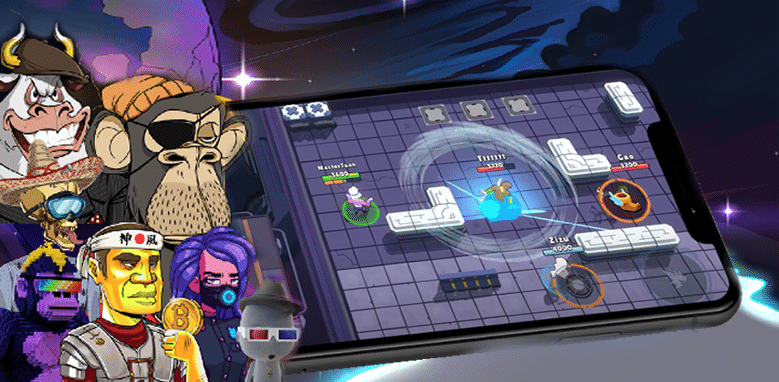While GCOIN will be created using the Ethereum-based ERC721 token standard, all subsequent game mechanics and items will be based on the Polygon blockchain, ensuring minimal fees will be incurred for each in-game action.
While exclusivity is a desirable characteristic of NFTs, and the one which gives them their unique, non-fungible traits, it is not of much help to social gamers who want to expand beyond the confines of the platform they originally purchased their NFT on.
The realization of this fact has spurred projects like Galaxy Fight Club to forge a cross-IP gaming platform which bridges the gaps between various intellectual properties and allows owners of disparate NFTs to play and compete with each other in the same virtual arena.

Galaxy Fight Club – Token Generation Event
After selling close to $10 million worth of NFTs which forms its Genesis Collection, Galaxy Fight Club is now approaching the date of its IDO (initial DEX offering), which took place on Jan. 6. The project’s native GCOIN token went on sale on prominent DEXs and CEXs (centralized exchanges) on the same day, as months of testing and securing partnerships culminates in a fully-fledged token launch.
Of the project’s 150 million GCOIN tokens, 6 million GCOIN are being sold on the IDO, out of which 25% will be made available during the token generation event (TGE), and will be subject to a 3-month vesting for all participants.
Over 20,000 applicants made their intentions known during the whitelist on Polkastarter, which will be one of the venues where people can purchase GCOIN tokens during the TGE. Other platforms where GCOIN will be made available include Chainboost, as well as MoonEdge – where an IDO has already been conducted and subsequently sold out in just 45 seconds.
A total of 40% of the available GCOIN will be issued to holders of their Genesis Fighters. By owning a Genesis Galaxy Fighter NFT, players will passively generate between 5-to-15 GCOIN each day. Those who didn’t purchase a Genesis Fighter during the NFT sale will still be able to purchase them on the secondary market (OpenSea).
Play-to-Earn, Not Pay-to-Win
According to the team, owners of Genesis NFTs won’t necessarily have an automatic advantage over other players, as the crux of the gameplay will rely on skill and aptitude rather than the starting stats of the player-character.
This is also the feature that prevents Galaxy Fight Club from descending into a race-to-the-bottom effort where players merely gobble up the best fighters and turn the game into a shallow pay-to-win affair. Rather, Galaxy Fight Club will be play-to-earn (P2E), with the native GCOIN token made tradeable with MATIC on popular exchanges like Uniswap.
While GCOIN will be created using the Ethereum-based ERC721 token standard, all subsequent game mechanics and items will be based on the Polygon blockchain, ensuring minimal fees will be incurred for each in-game action.
Just days remain until the token generation event on January 6, so now would be a good time to familiarize oneself with the cross-IP gaming platform which aims to unify the siloed NFT landscape by pitting them against each other.

Please check out latest news, expert comments and industry insights from Coinspeaker’s contributors.














